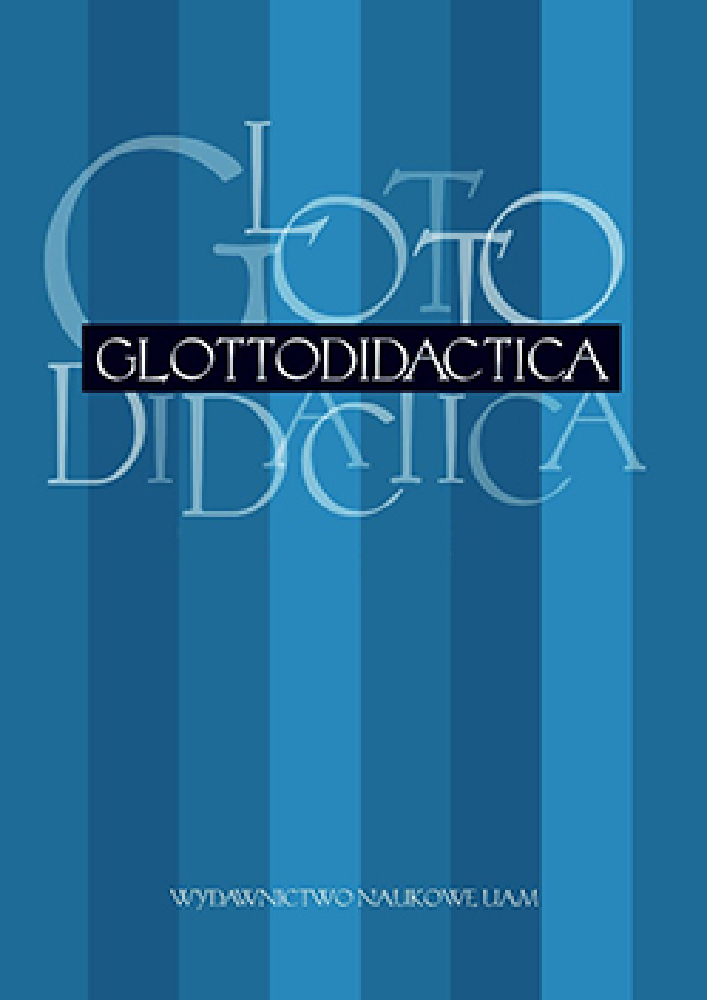Abstract
The common issue of writing concepts is modelling of the processes which can increase the ability of acquiring the writing competence. It is necessary to consider different aspects included in the process of acquiring the writing ability: cognitive, communicative, language productive, language receptive, language reflexive, rational and emotional aspects.References
Altendorf, J., 2008. Schreiben in der Fremdsprache - theoretische Grundlagen des Schreibprozesses und praktische Vorschläge fü r das Training der Fertigkeit „Schreiben" im Englisch-Unterricht der Sekundarstufe I. München: GRIN Verlag.
Baurmann, J./Weingarten, R., 1995. Prozesse, Prozeduren und Produkte des Schreibens. Opladen: Westdeutscher Verlag.
Bereiter, C., 1980. Development in Writing. In: Gregg, L.W., Steinberg, E.R. (Hrsg.)., Cognitive Processes in Writing. Hilsdale: Erlbaum.
Brauer, G., 1998. Schreibend lernen. Innsbruck: Studien-Verlag.
Brenner, G., 1990. Kreatives Schreiben. Frankfurt/Main: Cornelsen.
Brown, A., 1984. Metakognition, Handlungskontrolle, Selbststeuerung und andere, noch geheimnisvollere Mechanismen. In: Kluwe, R.H., Weinert, F.E. (Hrsg.), Metakognition, Motivation und Lernen, 61-103. Göttingen: Hogrefe.
Eigier G., Jechle, T., Merzinger, G.,Winter, A., 1990. Wissen und Textproduzieren. Tübingen: Narr.
Eigier, G., 1998. Zum Stand der Textproduktionsforschung. In: Unterrichtswissenschaft, 1. Weinheim: Juventa.
Flower, L., Hayes, J.R., 1981. A Cognitive Process Theory of Writing. In: College Composition and Communication 32, 365-387.
Gressillon, A., 1995. Über die allmähliche Verfertigung von Texten beim Schreiben. In: Raible, W., (Hrsg.), Kulturelle Perspektiven au f Schrift und Schreibprozesse, 1-36, Tübingen: Narr.
Ingendahl, W., 1996. Was denkt das Gehirn beim Schreiben? In: Wirkendes Wort, 2., Bonn: Bouvier.
Jechle, T., 1992. Kommunikatives Schreiben. Tübingen: Narr.
Kosevski, B., 1996. Freies Schreiben. Ein Versuch zur methodischen Entwicklung der sprachlichen Kreativität bei Studenten der Germanistik. Fallstudie. Klagenfurt, Wien, Insbruck: Institut für interdisziplinäre Forschung und Fortbildung.
Kosevski, B., 2004. Sozvocje prostega in vodenega: Pisanje pri pouku (tujih) jezikov. Ljubljana: DZS.
Krashen, S., 1984. Writing: Research, Theory and Applications. Oxford: Pergamon.
Ludwig, O., 1988. Schrift und Schriftlichkeit. Berlin, New York: de Gruyter.
Ortner, H., 2000. Schreiben und Denken. Tübingen: Niemeyer.
Rauch, W., 2000. Die Informationsgesellschaft und die Krise der Universität. In: Schröder, T.A., (Hrsg.), A u f dem Wege zur Informationskultur. Wa(h)re Information? Schriften der Universitäts-und Landesbibliothek Düsseldorf, 32: 25-30.
Schiefele, U., 1996. Psychologische Modelle des fremd gesteuerten und selbst gesteuerten Lernens. In: Weinert, F.E., (Hrsg.), Psychologie des Lernens und der Instruktion. Göttingen. 249-278.
Schoenke, E., 2005. Textdidaktische Überlegungen im Spannunngsfeld zwischen Textlinguistik und Unterrichtspraxis. In: Angewandte Textlinguistik. Perspektiven fü r den Deutsch- und Fremdsprachenunterricht, 77-93.
Schwanitz, D., 1999. Bildung. Alles, was man wissen muss. Frankfurt/Main: Eichborn.
Spinner, K. H., 1993. Kreatives Schreiben, ln: Praxis Deutsch, 119:17-23.
Stare, S., 2000. Bralno razumevanje. Bralna sposobnost ima nedmejene moznosti razvoja. In: Zbornik Bralnega drustva Slovenije, Ljubljana: Zavod republike Slovenije za solstvo.
Stare, S., 2004. Uradno besedilo pred maturo in po njej = Formal text before and after matura.
In: Iväek, M., Adamik-Jäszö, A., (Hrsg.), Poucevanje materinscine - naertovanje pouka ter preverjanje in ocenjevanje znanja: 3rd international symposium. Ljubljana: Zavod Republike Slovenije za äolstvo, 358-373.
Winter, A., 1992. Metakognition beim Textproduzieren. Tübingen: Narr.
Wrobel, A., 1995. Schreiben als Handlung. Tübingen: Niemeyer.
License
Authors
Authors of texts accepted for publication in Glottodidactica are required to complete, sign and return to the Editorial team’s office the Agreement for granting a royalty-free license to works with a commitment to grant a CC sub-license.
Under the agreement, the authors of the texts published in Glottodidactica grant Adam Mickiewicz University in Poznań a non-exclusive, royalty-free license and authorize the use of Attribution-NoDerivatives 4.0 International (CC BY-ND 4.0) Creative Commons sub-license.
The authors retain the right to the free disposal of the work.
Users
Interested Internet users are entitled to use works that have been published in Glottodidactica since 2016, under the following conditions:
▪ attribution – obligation to provide, together with the distributed work, information about the authorship, title, source (link to the original work, DOI) and the license itself.
▪ no derivatives – the work must be preserved in its original form. Without the author's consent, it is not possible to distribute the modified work in the form of translations, publications, etc.
Copyrights are reserved for all texts published before 2016.
Miscellaneous
Adam Mickiewicz University in Poznań retains the property right as a whole (layout, graphic form, title, cover design, logo etc.).
Privacy statement
The names and email addresses published on this journal site will be used exclusively for the purposes declared by this journal and cannot be used for any other purpose or by any other party.
